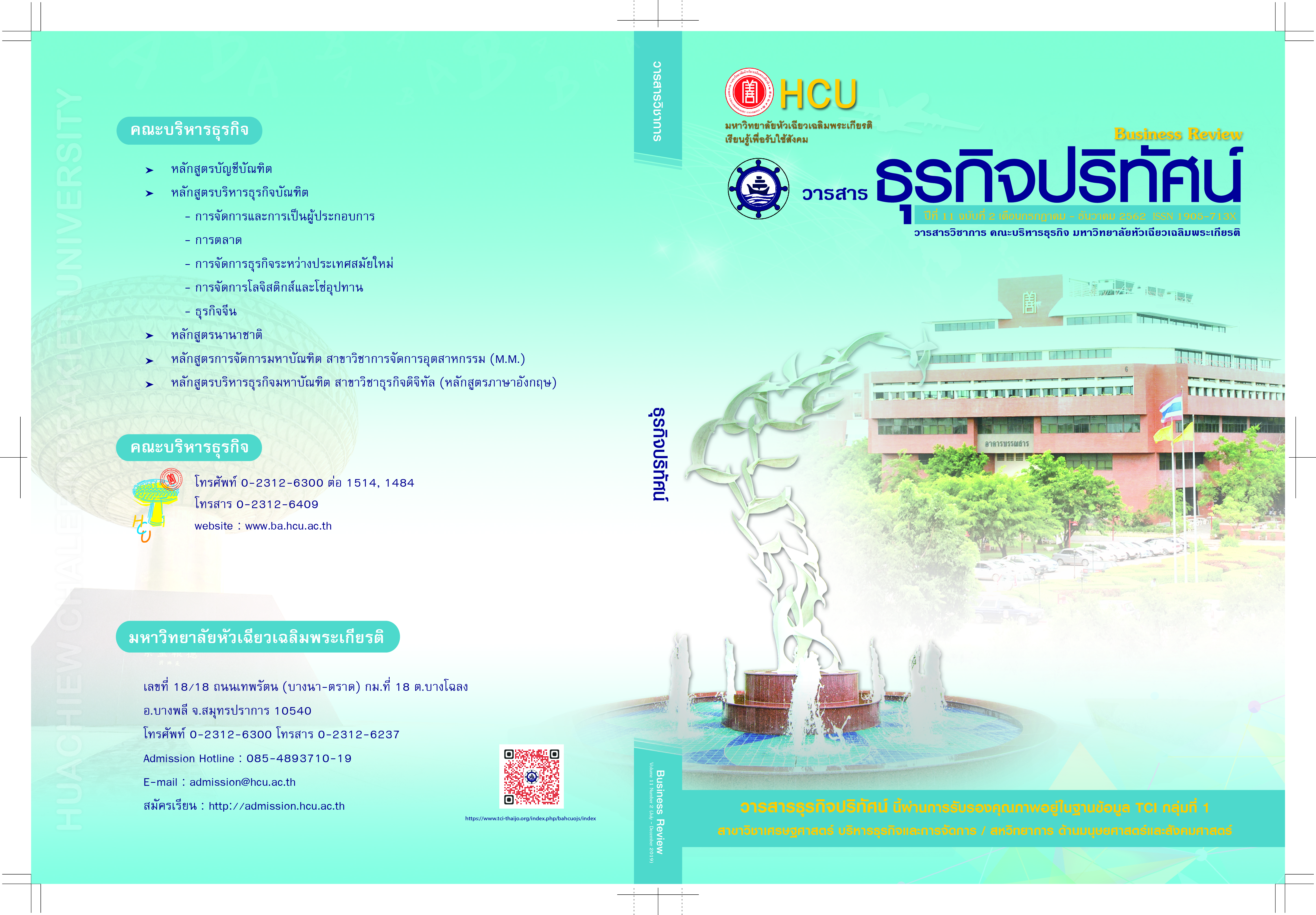A Study of the Meaning and Components of the Authentic Leadership in Thai Business
Keywords:
Authentic Leadership, Thai commercial businessAbstract
A confidence crisis in leaders of overseas and Thai companies in the past has decreased
the trust of the leaders. There has studied the authentic leadership both in Thailand and foreign
countries. This research aims to study the meaning and components of the authentic leadership
in Thai business organization which comply with Thai socio-cultural context. This research is
a qualitative research that uses case study method, life history type and exploratory case study.
The research collects the data by in-depth interview with 5 key informants. The individual case
study was analyzed by the pattern matching method. The research reliability was checked by
Methodological Triangulation and reflected data back to the main data provider (Member Check).
In data analysis across the case (Cross-case analysis), the results of the study of meaning and
elements of Authentic leadership in Thai business organizations revealed that self-awareness,
relational transparency, balancing the decision-making process, internalized moral perspective,
and self and others development.
References
กาญจนา สุดประเสริฐ. (2558). คุณสมบัติส่วนบุคคล อิทธิพลทางสังคม และความซื่อสัตย์ที่มีผลต่อภาวะผู้นำที่แท้จริงของนักเรียนมัธยมศึกษาตอนต้นโรงเรียนในเครือเซนต์ปอล เดอ ชาร์ตร. วารสารปัญญาภิวัฒน์ สถาบันการจัดการปัญญาภิวัฒน์. 7(1): 160-172.
ขวัญฤดี อาภานันท์. (2559). ภาวะผู้นำที่แท้จริงของผู้บริหารสถานศึกษาที่ส่งผลต่อประสิทธิผลของสถานศึกษา สำกัดสำนักงานเขตพื้นที่การศึกษามัธยมศึกษา เขต 9. วิทยานิพนธ์ คศ.ม. (บริหารการศึกษา). นครปฐม: บัณฑิตวิทยาลัย มหาวิทยาลัยราชภัฏนครปฐม. ถ่ายเอกสาร.
ธีรภัทร กุโลภาส. (2556). อิทธิพลของภาวะผู้นำที่แท้จริงที่มีผลสัมฤทธิ์ทางการเรียนของนักเรียนโดยมีการมองโลกเชิงบวกทางวิชาการและความยึดมั่นผูกพันของครูเป็นตัวแปรส่งผ่านและขนาดโรงเรียนเป็นตัวแปรปรับ : การวิจัยแบบผสมวิธี. วิทยานิพนธ์ ค.ด. (วิธีวิทยาการวิจัยการศึกษา). กรุงเทพฯ: ครุศาสตร์ จุฬาลงกรณ์มหาวิทยาลัย. ถ่ายเอกสาร.
นิรันดร์ เนตรภักดี. (2555). โมเดลสมการโครงสร้างภาวะผู้นำอย่างแท้จริงของผู้บริหารสถานศึกษา สังกัดกรมส่งเสริมการปกครองส่วนท้องถิ่น. วิทยานิพนธ์ ปร.ด. (การบริหารการศึกษา). ขอนแก่น: บัณฑิตวิทยาลัย มหาวิทยาลัยขอนแก่น. ถ่ายเอกสาร.
บัณฑิต นิจถาวร. (2559). สร้างประเทศด้วยธรรมาภิบาล. สืบค้นเมื่อ 10 พฤศจิกายน 2559, จาก https://www.bangkokbiznews.com/blog/detail/638588
รัตติกรณ์ จงวิศาล. (2556). ภาวะผู้นำ:ทฤษฎี การวิจัย และแนวทางสู่การพัฒนา. กรุงเทพฯ : สำนักพิมพ์แห่งจุฬาลงกรณ์มหาวิทยาลัย.
ศรุติพงศ์ ภูวัชร์วรานนท์. (2557). พฤติกรรมภาวะผู้นำที่แท้จริงของผู้บริหารโรงเรียนสังกัดสำนักงานเขตพื้นที่การศึกษาในจังหวัดสงขลา. รายงานการวิจัย. สงขลา: มหาวิทยาลัยราชภัฏสงขลา. ถ่ายเอกสาร.
สุชาดา สายทิ. (2556). อิทธิพลของเครือข่ายและกระบวนการเรียนรู้ของผู้นำที่แท้จริงต่อความผาสุกและความเข้มแข็งขององค์กรปกครองส่วนท้องถิ่นในภาคเหนือตอนบน. ดุษฎีนิพนธ์ ปร.ด. (บริหารศาสตร์). เชียงใหม่: บัณฑิตวิทยาลัย มหาวิทยาลัยแม่โจ้. ถ่ายเอกสาร.
สุธาสินี แสงมุกดา. (2554). การพัฒนาเครื่องมือวัดภาวะผู้นำที่แท้จริงของผู้บริหารสถานศึกษาขั้นพื้นฐาน. วิทยานิพนธ์ ค.ด. (บริหารการศึกษา). กรุงเทพฯ: ครุศาสตร์ จุฬาลงกรณ์มหาวิทยาลัย. ถ่ายเอกสาร.
Avolio, B. J., & Gardner, W. L. (2005). Authentic leadership development: Getting to the root of positive forms of leadership. The leadership quarterly, 16(3), 315-338.
Avolio, B. J., & Mhatre, K. H. (2011). Advances in Theory and Research on Authentic Leadership. Oxford: Oxford.
Creswell, J. W. (2003). Research design: Qualitative, quantitative, and mixed methods approaches (2nd ed.). Thousand Oaks, CA: Sage.
Development Dimension International, Inc. (2014). Ready-Now leaders: 25 findings to meet tomorrow’s business challenges. Global leadership forecast 2014 I 2015. Retried April, 2017, from https://www.ddiworld.com/ddi/media/trend-research/global-leadership-forecast-2014-2015_tr_ddi.pdf?ext=.pdf.
George, B. (2003). Authentic leadership: Rediscovering the secrets to creating lasting value. John Wiley & Sons.
George, B. (2007). True north: Discover your authentic leadership (Vol. 143). John Wiley & Sons.
Luthans, F., & Avolio, B. (2003). Authentic Leadership Development. In Cameron, K., Dutton, J.E., & Quinn, R.E. (Eds.), Positive Organizational Scholarship. San Francisco: Berrett-Koehler. Chapter 2 pp: 241-258.
Meyers, S. (2007). Growing leaders in your own back yard. Trustee: Journal for hospital governing boards, 60(6), 8-11.
Sparrowe, R. T. (2005). Authentic leadership and the narrative self. The leadership quarterly, 16(3), 419-439.
Stake, R. E., (2006). Multiple Case Study Analysis. New York: The Guilford Press.
Walumbwa, F. O., Avolio, B. J., Gardner, W. L., Wernsing, T. S., & Peterson, S. J. (2008). Authentic leadership: Development and validation of a theory-based measure. Journal of management, 34(1), 89-126.
Walumbwa, F. O., Luthans, F., Avey, J. B., & Oke, A. (2009). Authentically Leading Group: The Mediating Role of Collective Psychological Capital and Trust. Journal of Organizational Behavior.
Yin, Robert K. (2003). Case Study Research: Design and Methods. 3rd ed. California: Sage publication, Inc.
Downloads
Published
How to Cite
Issue
Section
License
บทความที่ได้รับการตีพิมพ์เป็นลิขสิทธิ์ของวารสารธุรกิจปริทัศน์
ข้อความที่ปรากฏในบทความแต่ละเรื่องในวารสารวิชาการเล่มนี้เป็นความคิดเห็นส่วนตัวของผู้เขียนแต่ละท่านไม่เกี่ยวข้องกับมหาวิทยาลัยหัวเฉียวเฉลิมพระเกียรติ และคณาจารย์ท่านอื่น ๆ ในมหาวิทยาลัยฯ แต่อย่างใด ความรับผิดชอบองค์ประกอบทั้งหมดของบทความแต่ละเรื่องเป็นของผู้เขียนแต่ละท่าน หากมีความผิดพลาดใดๆ ผู้เขียนแต่ละท่านจะรับผิดชอบบทความของตนเองแต่ผู้เดียว





